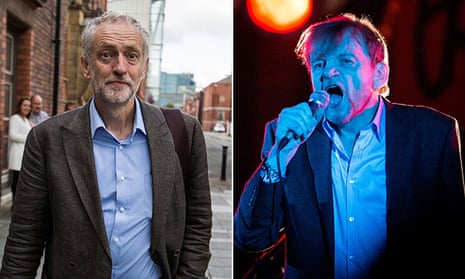Is it true that Jeremy Corbyn was, briefly, the 37th guitarist in the Fall? And that, by all accounts, he held down the role rather impressively for a couple of hours in the early 80s before Mark E Smith unexpectedly fired him for not nodding his head at an acute enough angle during the climax of Hip Priest?
There is not, I concede, a glut of evidence to support this rumour. But as Prestwich’s finest get set to trudge their way across the country’s venues once more in support of their 31st album – no doubt as obstinate and oblivious to prevailing trends as ever – it is hard to escape the similarities between them and JC.
In fact, it is hard to escape the similarities between JC and alternative music in general. While other Labour MPs compete for indie cred by publicly pretending they used to be fans of Suede or the Monochrome Set or whoever, Corbyn opts not to talk the indie talk but to walk the indie walk. Indeed, his whole career seems to be based upon that well-worn rock mantra: “I just do what I do, and if anyone else likes it, it’s a bonus.”
Reopening the coal mines? Decommissioning the army? Like a bunch of Leeds art-school grads recording an angular missive about Ludwig Wittgenstein and post-war architecture in a bedsit, Corbyn has never cared if only 57 people buy it because he appreciates that those 57 people are really, really into it. He wants to be the kind of politician of whom people might say, 30 years down the line: “Sure, hardly anybody voted for him, but those who did all went on to form their own leftwing political party.”
The more you look into this analogy, the stronger it becomes. Just take the Corbyn cover version of God Save the Queen, which is already the most obscure, sought-after musical statement of the past 100 years; as with Radiohead’s Creep, the artist’s reluctance to perform it live has only stoked fan interest.
Then there is his ability to kick against the pricks, question society’s norms and manufacture the kind of rebellious uproar that would have made the Sex Pistols blush. In fact, there is an almost cathartic aspect to watching Corbyn live the life we all secretly dream we could be living, if only we had the backbone for it: refusing to bow for the Queen, telling Sky reporters to get lost; somehow managing to cause offence to the entire armed forces by wearing brown shoes on the fourth Thursday after the anniversary of 9/11.
If anything, Jezza is more subversive than the Pistols, generating his daily doses of tabloid outrage without ever resorting to anything as basic as swearing on live TV, trashing a hotel room or, indeed, doing anything other than looking like a mildly perplexed 66-year-old man in a rumpled brown suit jacket. Just contrast this with the so-called rebellion caused by actual rock’n’rollers in 2015: last week alone, Ozzy Osbourne apologised for once urinating on the Alamo, and Noel Gallagher revealed that most bands he meets are obsessed with getting good reviews in the Guardian. The most controversial story of the year so far is Adele saying she shouldn’t have tried to write songs with Damon Albarn. Counterculture rebellion has handed in its resignation letter, and people are desperately scrabbling around for something – anything – to fill the gap.
Corbyn fits the bill because he finds himself poised at an interesting crossroads. To put it once more in indie terms, he has written an unexpected mainstream hit by winning the Labour leadership election, and now has to decide whether or not to sign with a major.
The big money is certainly there if he wants it – the stylists are hovering, offering to resize his suits, fix his top button and stuff a poppy in his pocket while he’s not looking. There are speechwriters and media trainers promising to shape hit policies for him. Yet he knows it is going to alienate the original fanbase, who will say they preferred him before he got big.
So does he want to keep putting out limited-edition 7in singles, such as the dismantling of Trident, to a small but devoted minority? Or should he take a leap for the big time, and start making bland statements about reducing the deficit in the hope that it scores him an unpalatable Christmas No 1?
To answer the question, perhaps it is wise to look at the band Corbyn’s rise most closely resembles – not the Fall, but Jarvis Cocker’s Pulp. Like Corbyn, Cocker was doggedly existing on the margins, doing his own peculiar thing before being thrust, semi-willing, into the limelight.
The worrying thing with this analogy is that Cocker – ultimately – couldn’t hack the spotlight. He responded by putting out This Is Hardcore, a deeply perverted, wholly uncommercial statement about loathing, misanthropy and alienation that eventually proved to be a turn-off for much of the general public. This isn’t really a viable option for Corbyn, because David Cameron has been putting those out for the past few years now. And, as any true indie fan will tell you: nobody likes a bandwagon-jumper.

